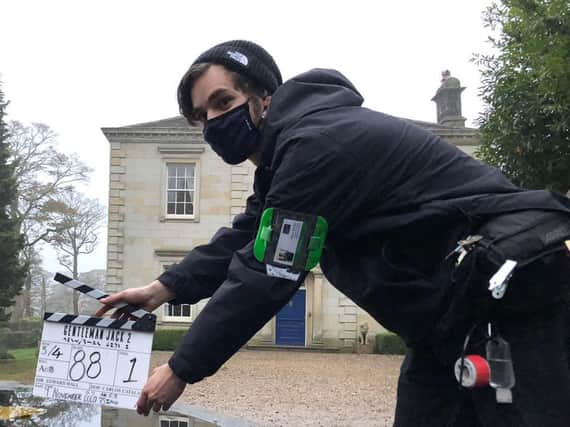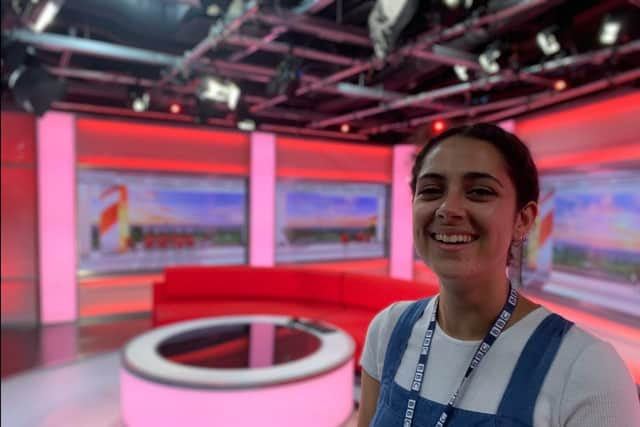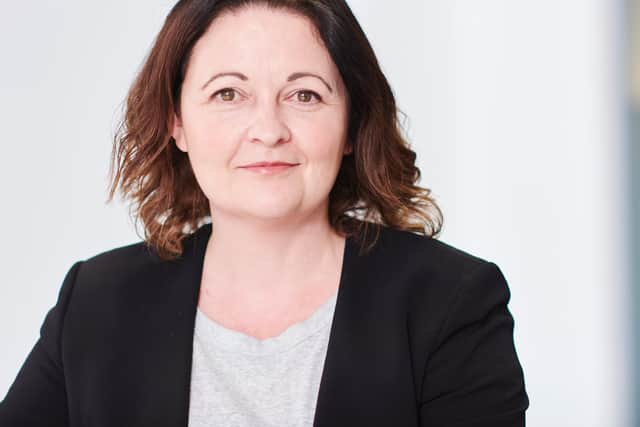Meet some of the Yorkshire talent supporting the return to screen production on shows like Gentleman Jack


“When you close down St James’s Park in Westminster and you fill it with Second World War tanks and that works – and when you close streets off and you blow buses up and that works and nobody has been hurt – you get a great buzz from those sorts of things.”
Martin Campbell reflects on some of the highlights from his more than 20 years in production in the nation’s screen industry. Those particular memories are of his time working on Traitors, a spy thriller set in London in 1945, for Channel 4, but he counts taking members of the cast and crew of Yorkshire-based Emmerdale to film in both France and Spain and securing a reservoir tunnel never filmed in before as a set location for ITV crime drama Vera as among his other stand out moments.
Advertisement
Hide AdAdvertisement
Hide Ad“Finding those little gems is great,” says the 53-year-old, who grew up in Dewsbury. “I always believe location is the third character and you’ve got to work to make sure it fits the characters, it fits the scenes and also look a little bit off the page to find something that’s going to add visuals to the show.”


Martin, who lives just outside of Pontefract, is among the Yorkshire talent supporting the nationwide return to television production after measures put in place to try to control the spread of the coronavirus pandemic brought much of the screen industry to a grinding halt back in March.
The Government gave the green light for TV and film shooting to restart two months later and has given its support for production to continue now despite England’s current lockdown restrictions.
Kaye Elliott, the director of high-end television at ScreenSkills – the skills body that supports the workforce of screen industries including film, television, visual effects, animation and games, to develop and grow – says the closedown in production impacted not only on the programmes themselves but on jobs and the opportunities for people to start or progress their careers.
Advertisement
Hide AdAdvertisement
Hide Ad“It was a challenging time and a scary time because we didn’t know when the pandemic hit how long we were looking at [without production] and we didn’t know whether the industry would recover quickly or not,” explains Kaye, who is based in Sheffield.


“But I’m relieved to say that for high end TV particularly, from June really we’ve seen an absolute bounceback.”
“I think one of the things the pandemic and lockdown taught us is that content is key,” she continues. “It created a resurgence, a drive and a confidence that all types of television, film, games etcetera are what people need during the pandemic but also in their lives more generally.”
That desire for content, coupled with the Government’s £500 million Film and TV Production Restart Scheme which is designed to support screen productions struggling to get insurance for Covid-related costs, means production has been “back with a boom”, she says.
Advertisement
Hide AdAdvertisement
Hide Ad“That appetite and desire for content means we are definitely seeing a huge upsurge in people wanting to get content made. That’s brilliant - for individuals, for people wanting to work in production and for facilities that feed in and support the infrastructure, whether that’s taxis or accommodation.”
The return to the screen means ScreenSkills is now in talks or working with more than 80 productions shooting across the UK to support people taking part in its schemes including a paid work placement traineeship and a programme which helps individuals move into more senior roles.
Sara Churchman is on the former, currently working on detective drama McDonald and Dodds, which is filming in Bristol. The 25-year-old started on the show as a production secretary, an administrative role, in July, and because of the pandemic, has done much of her work from the spare room of her home in York.
“The most important area I cover is all the travel and accommodation, getting everyone to and from Bristol, the cast and crew, and putting them up,” she says. “It was an interesting week with the second lockdown because whilst we’re fortunate to be able to continue filming, businesses around us that we interact with have closed down so there has been a lot of shifting people around.”
Advertisement
Hide AdAdvertisement
Hide AdSara had her first taste of production with Leeds-based True North television company last year, later doing a placement as a runner with children’s show Class Dismissed before joining Air TV in Church Fenton as a production assistant and working on programmes including Helicopter ER and The Great Staycation: Lakeland Adventure.
“I have always felt quite split because when you’re at school it’s always a bit like you’re either a science person or you’re a creative person,” she says. “For me, TV offers quite a lot of crossover, especially in production. It’s really nitty gritty, very technical, very specific, but also it’s about creating something that people sit at home and see when they turn on the TV. That’s what draws me to it is that I don’t have to pick and can have a bit of both.”
“There’s so much going on here in Yorkshire,” she adds. “It’s always a case of having your ear to the ground and looking for opportunities.”
Camera trainee James Sudder, who lives in Halifax, has already found plenty of work on his doorstep in the short time he has been in the industry.
Advertisement
Hide AdAdvertisement
Hide AdAfter studying at The Northern Film School in Leeds, he embarked on the ScreenSkills trainee scheme last year, with placements working on Sally Wainwright’s Bafta-winning series Last Tango in Halifax, crime drama Traces and surveillance thriller Viewpoint.
Less than a month ago, he began his first job after finishing the scheme, accepting work on the second series of Gentleman Jack. Another of Wainwright’s acclaimed dramas, this one set in West Yorkshire in the 1800s and inspired by the coded journals and true story of Anne Lister of Halifax’s Shibden Hall, the first series of the show proved hugely popular both in the UK and US and across the world.
James, 23, is proud to be working on something with global renown so early on in his career. “I’m just doing my job and it’s strange to think that in however many months time it will be on TV,” he says. “Gentleman Jack is huge in America as well so it feels surreal walking around my hometown thinking this is where it’s being filmed and people will be watching in the US. I’m quite proud to be where I am.”
Martin, meanwhile, has worked on shows across the country throughout his production career. His current position is as a line producer – a senior member of the production team typically responsible for hiring crew and making sure filming is done safely, creatively, on budget and on time – on Grace, a new drama for ITV which is filming in Brighton.
Advertisement
Hide AdAdvertisement
Hide AdHe was a location manager for two decades, finding and overseeing filming sites, and was supported into his new role through one of the ScreenSkills schemes.
“When a film crew goes onto a location, we do takeover and it’s about managing the public and the owner’s expectations about what will be going on and always being honest about what we are going to do,” he says. “My ethos has always been to make sure I could go back to that location - if you can go back, you know they’re happy. As location manager, you’re the person between the production and location owner.
“Yorkshire has got so much to offer and it’s not actually over-filmed so you still get a good response from location owners and councils, they’re all very supportive...It’s a fantastic place to film with so much variation available - the moors, the coast, cities. The crews here are warm people and want to go out and make good content.”
With ITV and Channel 4 both having bases in Yorkshire, and the region also being home to a range of independent production and television companies, Kaye says there’s a wealth of opportunity for local talent to enjoy a “long and successful” career in screen industries.
“I think production in Yorkshire has a fantastically bright and vibrant future,” she says. “It can only go one way for Yorkshire – and that is positively.”